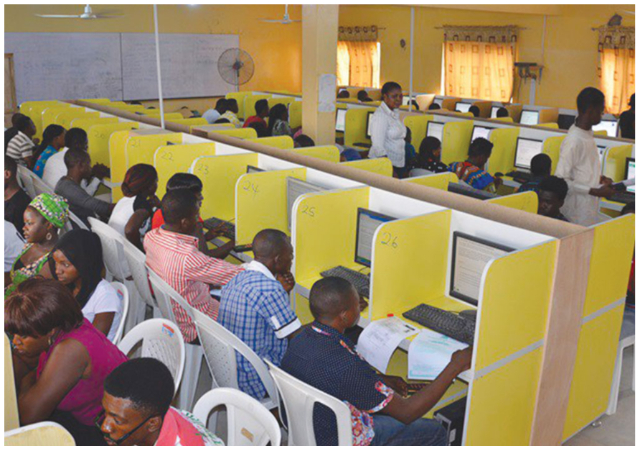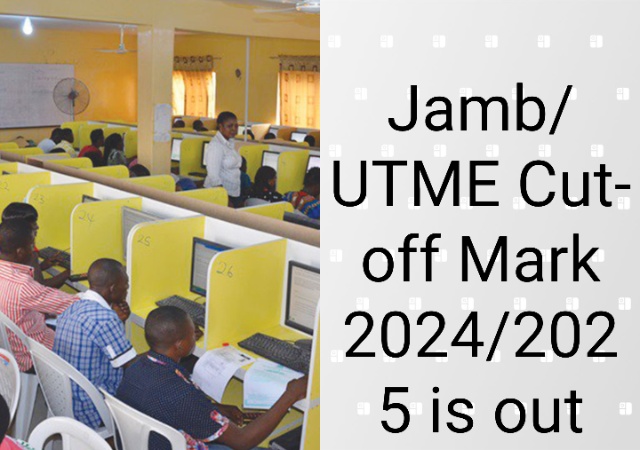
JAMB stands for the Joint Admissions and Matriculation Board. It is a Nigerian entrance examination board for tertiary-level institutions. The board conducts the Unified Tertiary Matriculation Examination (UTME), which is a mandatory standardized test for candidates seeking admission into Nigerian universities, polytechnics, and colleges of education.
The UTME is typically taken by candidates in their final year of secondary school, and it is used to assess their readiness for university-level education. The test is usually taken in April or May of each year and it covers subjects such as English, mathematics, and three other subjects relevant to the candidate’s chosen field of study.
In addition to the UTME, JAMB also conducts the Direct Entry (DE) examination for candidates who have already completed at least two years of a related tertiary program and wish to enter into 200 level in the university.
JAMB also conducts the Post-UTME test, which is an additional entrance examination conducted by individual universities to further screen candidates who have applied to the institution and have passed the UTME.
JAMB also conduct the registration and accreditation of private candidates and foreign candidates. It also provides the Central Admissions Processing System (CAPS) which is an online platform that enables candidates to apply for admission to their preferred institutions and tracks their admission status.
History of jamb
The Joint Admissions and Matriculation Board (JAMB) was established in 1978 by the Federal Government of Nigeria as a way to standardize the process of gaining admission into tertiary-level institutions in the country.
JAMB was created as a response to the high number of students who were seeking admission into universities, polytechnics and colleges of education, and the lack of a consistent and fair system for selecting candidates.
Before the creation of JAMB, each institution had its own entrance examination and selection process, which often resulted in inconsistencies and favoritism. The establishment of JAMB aimed to create a more fair and transparent system for selecting candidates, which would be based on merit rather than personal connections or influence.
JAMB started conducting the Unified Tertiary Matriculation Examination (UTME) in 1979, which is a mandatory standardized test for candidates seeking admission into Nigerian universities, polytechnics, and colleges of education. The first UTME was conducted simultaneously in 53 centers across the country, with about 34,000 candidates sitting for the examination.
Over the years, JAMB has undergone several changes and improvements, including the introduction of computer-based testing, and the creation of the Central Admissions Processing System (CAPS) which is an online platform that enables candidates to apply for admission to their preferred institutions and tracks their admission status.
JAMB has been playing a vital role in the education sector of the country and it has become a household name in Nigeria. The board has been ensuring that the admission process is fair, transparent and based on merit, thus providing a level-playing ground for all candidates.
JAMB: UTME Subject Covered
The Joint Admissions and Matriculation Board (JAMB) conducts the Unified Tertiary Matriculation Examination (UTME), which is a mandatory standardized test for candidates seeking admission into Nigerian universities, polytechnics, and colleges of education. The subjects covered in the UTME vary depending on the candidate’s chosen field of study.
The subjects covered in UTME are:
- English Language: All candidates are required to take this subject.
- Mathematics: All candidates are required to take this subject.
- Three other subjects relevant to the candidate’s chosen field of study.
For candidates who want to study Medicine, Law, Sciences, Social Sciences, Arts and Humanities the following are the subject combinations:
- Medicine and Surgery: English Language, Physics, Chemistry and Biology
- Law: English Language, Government and any other two Arts or Social Science subjects
- Sciences: English Language, Physics, Chemistry and any of Biology, Mathematics, Geography
- Social Sciences: English Language, Government, Economics and any other Social Science subject
- Arts and Humanities: English Language, Literature in English, Government and any other Arts subject
For candidates who want to study Engineering, Technology, Environmental Studies, Agriculture and Education the following are the subject combinations:
- Engineering: English Language, Physics, Mathematics and any of Chemistry, Biology, Agricultural Science
- Technology: English Language, Physics, Mathematics and any of Chemistry, Biology, Agricultural Science
- Environmental Studies: English Language, Physics, Mathematics and any of Chemistry, Biology, Agricultural Science
- Agriculture: English Language, Physics, Mathematics and any of Chemistry, Biology, Agricultural Science
- Education: English Language, Mathematics, any two of Physics, Chemistry, Biology, Economics, Commerce, Government, Literature in English, Geography, Christian Religious Studies, Islamic Religious Studies, History.
It is important to note that these subject combinations are subject to change and candidates should check the official JAMB website or brochure for the most up-to-date information.
Cost of JAMB UTME Form
The cost of the Joint Admissions and Matriculation Board (JAMB) Unified Tertiary Matriculation Examination (UTME) form varies from year to year, and can be subject to change.
As of my knowledge cutoff in 2021, the cost of JAMB UTME Form is N3,500. This fee includes the cost of the application form, the UTME examination fee, and a brochure containing important information about the examination and the registration process.
It is important to note that this cost is subject to change and candidates should check the official JAMB website or brochure for the most up-to-date information about the cost of the UTME form and any additional fees that may apply.
It is also advisable to pay attention to the official JAMB website for the registration process and the deadline to avoid the late registration fee.
JAMB FAQs
Here are some frequently asked questions (FAQs) about the Joint Admissions and Matriculation Board (JAMB) and the Unified Tertiary Matriculation Examination (UTME):
- What is JAMB? JAMB is the Joint Admissions and Matriculation Board. It is a Nigerian entrance examination board for tertiary-level institutions. The board conducts the Unified Tertiary Matriculation Examination (UTME), which is a mandatory standardized test for candidates seeking admission into Nigerian universities, polytechnics, and colleges of education.
- What is the UTME? The UTME is the Unified Tertiary Matriculation Examination. It is a mandatory standardized test conducted by JAMB for candidates seeking admission into Nigerian universities, polytechnics, and colleges of education.
- When is the UTME held? The UTME is usually held in April or May of each year. The exact date and schedule are usually released by JAMB on their official website.
- What are the subjects covered in the UTME? The subjects covered in the UTME vary depending on the candidate’s chosen field of study. Generally, all candidates are required to take English Language and Mathematics. Additionally, candidates will be required to take three other subjects relevant to their chosen field of study.
- What is the cost of the UTME form? The cost of the UTME form varies from year to year and can be subject to change. As of my knowledge cutoff in 2021, the cost of the UTME form is N3,500, including the cost of the application form, the UTME examination fee, and a brochure containing important information about the examination and the registration process.
- How do I register for the UTME? Candidates can register for the UTME online via the official JAMB website. The registration process usually involves filling out an online application form, paying the necessary fees, and uploading required documents.
- How can I check my UTME results? Candidates can check their UTME results online by visiting the official JAMB website and entering their personal information, such as their registration number and date of birth.
- What is the cut-off mark for the UTME? The cut-off mark for the UTME varies depending on the institution and course of study. It is usually determined by JAMB and the institution, and is based on factors such as the number of available spaces, the number of candidates applying, and the overall performance of candidates in the UTME.
It’s important to note that JAMB’s official website is the best place to get the most updated and accurate information regarding their policies and procedures.


Leave a Reply